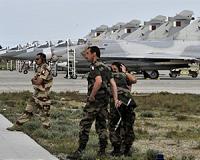| . |  |
. |
Brussels (AFP) March 31, 2011 NATO finally took full command of all Libyan operations on Thursday, but only a minority of the 28 allied nations will conduct the bombings that had been under US leadership until now. An armada of ships and warplanes from the United States, France, Britain, Canada and other coalition nations came under NATO control after the alliance overcame internal divisions to take over the mission. "On Thursday morning at 0600 GMT, NATO took sole command of international air operations over Libya," said NATO Secretary General Anders Fogh Rasmussen. "In line with the mandate of United Nations Security Council Resolution 1973, NATO's focus is on protecting civilians and civilian-populated areas against the threat of attack," Rasmussen said. US, British, French, Canadian, Danish and Belgian fighter jets have conducted air raids against Moamer Kadhafi's ground forces under a UN mandate to use "all necessary measures" to protect civilians. But key NATO members have voiced unease about the bombing missions. Turkey, NATO's sole Muslim member, criticised the scope of the coalition strikes that began on March 19 and has made clear its planes would not take part in any air strikes. Another major NATO member, Germany, refused to vote for the UN Security Council resolution that authorised the use of force and will stay out of the offensive operations. The Netherlands has contributed planes but they will only participate in a no-fly zone to prevent hostile jets from flying, not the ground strikes. Several smaller NATO nations are unable to participate in the mission because they lack the assets. NATO wants to bring outside partners into the mission, especially Arab natinos. Qatar and the United Arab Emirates are the only Middle Eastern nations to have provided jets. Sweden, a NATO partner, offered fighter jets but said they would not conduct ground strikes. NATO ships have been enforcing an arms embargo off Libya's coast since last week and alliance planes began the no-fly zone mission on Sunday. NATO agreed to take on the broader mission -- strikes against forces threatening civilians -- after overcoming Turkish concerns about the air strikes and French reluctance to hand the lead to the alliance. Warplanes and other military assets from several allies began to operate under the NATO umbrella on Wednesday and the process was completed early Thursday. A NATO diplomat said the operation began a day later than planned "because of the complexity" of the transfer, with dozens of warplanes required to switch from national to alliance command. The United States, already stretched after a decade of combat in Afghanistan and a fragile situation in Iraq, had been eager to hand over control of the mission to someone else. The NATO mission, codenamed "Operation Unified Protector," is being directed by a Canadian general, Charles Bouchard, from the alliance's regional command centre in Naples, Italy. Attempting to convince a war-weary public about his decision to intervene in Libya, US President Barack Obama vowed Wednesday that the US military would reduce its own involvement, playing only a supporting role.
Share This Article With Planet Earth
Related Links
 Years of Franco-Qatari cooperation in practice over Libya
Years of Franco-Qatari cooperation in practice over LibyaSouda, Greece (AFP) March 31, 2011 Brought together by a common cause and a shared experience, French and Qatari fighter crews are flying joint missions out of Greece to enforce the UN-mandated no-fly zone over Libya. A section of the Greek base of Souda on the island of Crete has now become home for the two nations' pilots and some 300 personnel helping to keep up twice-daily sorties in Libyan airspace against Moamer Kadhafi ... read more |
|
| The content herein, unless otherwise known to be public domain, are Copyright 1995-2010 - SpaceDaily. AFP and UPI Wire Stories are copyright Agence France-Presse and United Press International. ESA Portal Reports are copyright European Space Agency. All NASA sourced material is public domain. Additional copyrights may apply in whole or part to other bona fide parties. Advertising does not imply endorsement,agreement or approval of any opinions, statements or information provided by SpaceDaily on any Web page published or hosted by SpaceDaily. Privacy Statement |